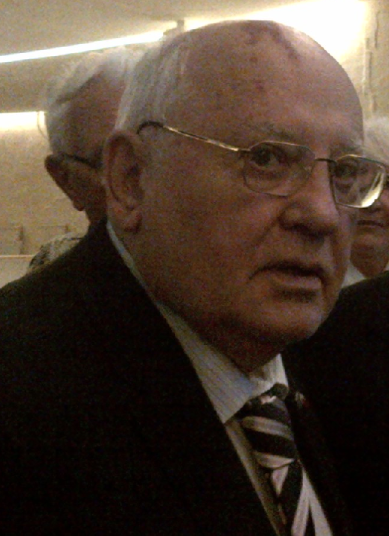Published in French on 1 September 2022
 Gorbachev in Geneva, September 2013.
Gorbachev in Geneva, September 2013.
Photo JM Matagne/ACDN © contact@acdn.net
A very great man, perhaps the greatest in all human history, has just left us.
Mikhail Sergeyevich Gorbachev, born on 2 March 1931 in Privolnoie, died on the evening of 30 August 2022 in Moscow’s Central Clinical Hospital.
This man of peace partially changed the face of the world for at least a decade at the end of the 20th century. Having become in 1985 the head of the Communist Party and of the Soviet Union, he used his power to try to reform the nation’s economy through perestroika and to democratize it through glasnost. In both cases he was seeking to humanize the bureaucratic Soviet regime. His efforts encountered numerous obstacles and powerful resistances, notably from a part of the KGB and the apparatchiks who profited from the regime... many of whom later converted from the state capitalism, called communism, to private capitalism.
The very limited success, or lack of success of Mikhail Gorbachev in internal politics should not make us forget his great contribution to the well-being of humanity: the end of the Cold War and the pacification (unfortunately temporary) of the affairs of the world.
In March 1985 when he became secretary-general of the Soviet Communist Party, Gorbachev began a dialogue with the US President, Ronald Reagan, who two years earlier considered the Soviet Union as the "Evil Empire". The two men met for the first time in Geneva in November 1985, after a period of extreme tension between the USA and the USSR.
In January 1986, Gorbachev lauched the slogan "No nuclear weapons by the year 2000!". He acted constantly for this until the signing, in Washington on 8 December 1987, of the Treaty on Intermediate Nuclear Forces, the first elimination treaty - which put an end to euromissiles, opened the way to Soviet-US cooperation in numerous domains, and radically changed the international atmosphere, at the same time as the withdrawal of Soviet forces from Afghanistan. It was this new era which made possible the fall of the Berlin Wall two years later, on December 1st,1989, and the end of the Cold War (Treaty of Moscow, 12 September 1990; Memorandum of Budapest, 5 December 1994). This concluded 45 years of military tensions and division in Europe - all that without a shot being fired, without one death.
Unfortunately the militaristic lobbies of the West and the East have progressively sapped the spirit of peace and disarmament which reigned then. Gorbachev, although he survived an attempted putsch driven by the hard men of the KGB and the Communist Party, was forced to resign in De ember 1991. The West, for its part, did not keep the promises not to expand NATO towards the East - promises that were made to Gorbachev and Chevardnadze in consideration of the reunification of Germany and its adherence to NATO, despite the dissolution of the Warsaw Pact.
Mikhail Gorbachev had a global vision of international relations - it was humanist, social, peaceful and ecological. He was not a saint, but he was a sage, and the current leaders of the world, beginning with those who possess nuclear weapons, would do well to be inspired by his recommendations.
ACDN (Action des Citoyens pour le Désarmement Nucléaire) owes its existence to him, and will continue to draw inspiration from his messages.
Mikhail Gorbachev : Message to ACDN concerning the third International Rally for Disarmament, Nuclear, Biological and Chemical (RID-NBC, 9-11 May 2008) :
"I wish to congratulate the organisers of this event for raising the level of awareness concerning one of the most difficult challenges of our time: a challenge that can be met only by the elimination of nuclear, biological and chemical weapons throughout the world."
Mikhaïl Gorbatchev : Dire adieu aux armes nucléaires (9 octobre 2011)
Mikhaïl Gorbatchev : Une nouvelle course aux armes nucléaires a commencé (25 octobre 2018)
Mikhaïl Gorbatchev : Quand la pandémie sera passée, le monde devra se rassembler (15 avril 2020)
Saintes, 6 août 2022 : Cérémonie publique pour abolir les armes nucléaires et radioactives. Hiroshima, Nagasaki, plus jamais ça





